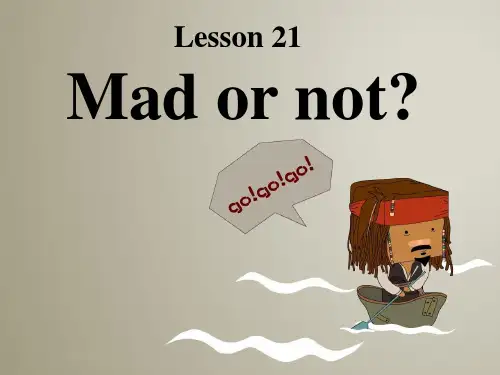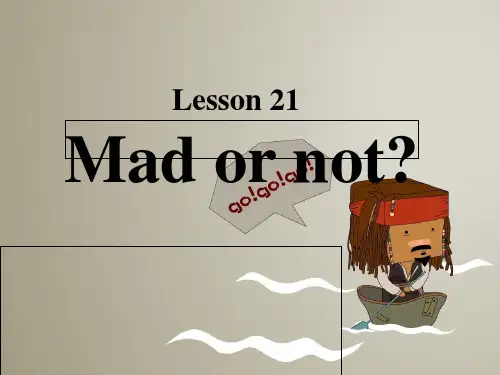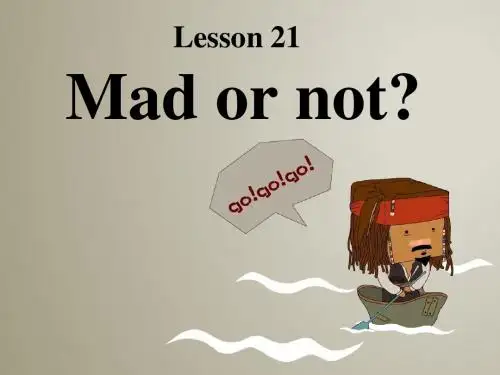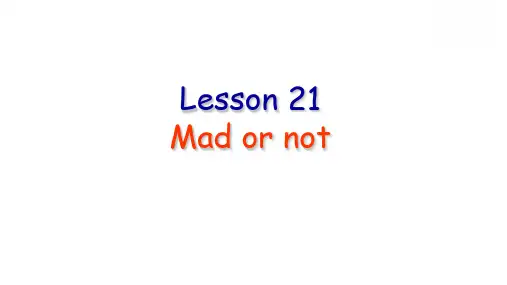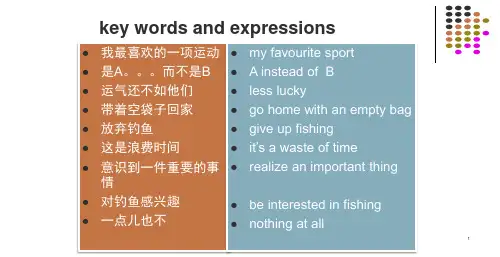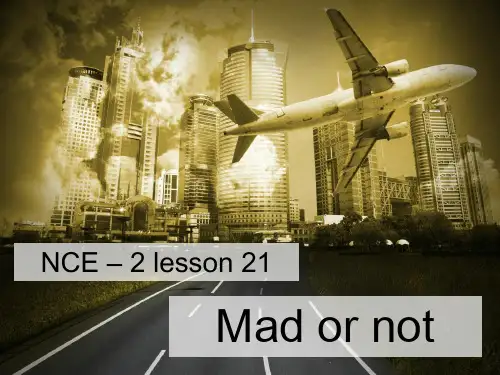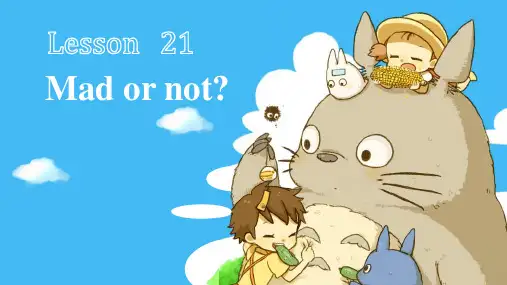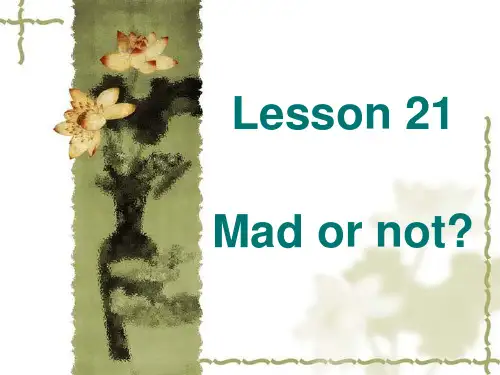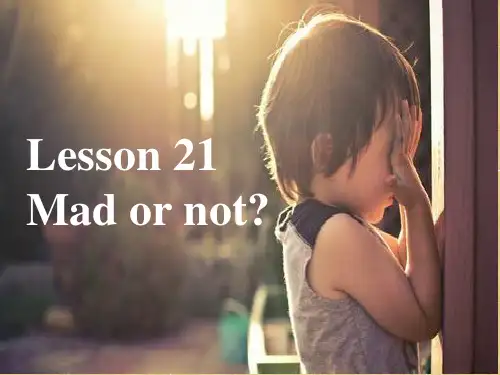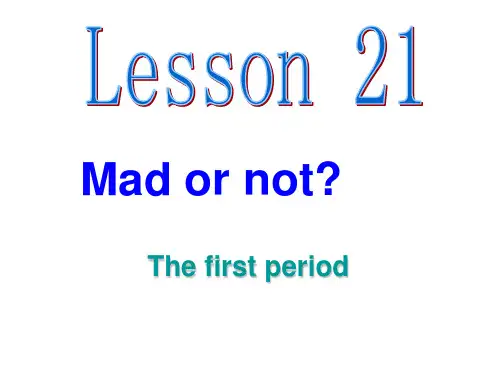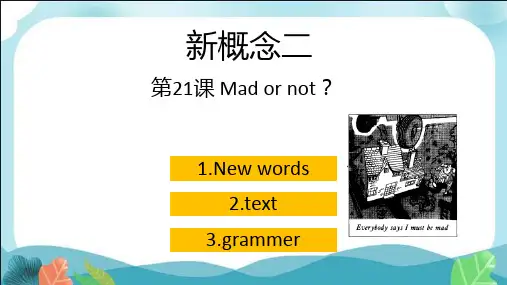- 1、下载文档前请自行甄别文档内容的完整性,平台不提供额外的编辑、内容补充、找答案等附加服务。
- 2、"仅部分预览"的文档,不可在线预览部分如存在完整性等问题,可反馈申请退款(可完整预览的文档不适用该条件!)。
- 3、如文档侵犯您的权益,请联系客服反馈,我们会尽快为您处理(人工客服工作时间:9:00-18:30)。
动词语态
英语动词有两种语态
主动语态:主语是动作的执行者 被动语态:主语是动作的承受者
Many people speak English.(主动语态)
English is spoken by many people.(被
动语态)
Read the following sentences
1.It is called a stamp. 2.What’s it made of? 3.Which language is spoken by the largest
I have been offered a large sum of money to go away,but I am determined to stay here.
及物动词 vt.
1.给予,提供;拿出,出示[O1][(+to)] He offered me a glass of wine. 他端给我一杯酒。 2.愿意;试图(做某事);提议[Y][+to-v] They offered to help me. 他们表示愿意帮助我。 He offered to lend me some books. 他表示要借给我几本书。 3.出(价);开(价)[O1] We offered him the calculator for US$50. 这计算器我们向他开价五十美元。
被动语态(be+过去分词) am(is,are)+seen was(were)+seen will(shall)+be+seen would(should)+be+seen am(is,are)+being+seen was(were)+being+seen have(has)+been+seen had+been+seen 情态动词+be+seen
☆mad adj. 发疯
be mad/crazy about:为……而疯狂 be mad at sb eg:Don't be mad at him。 别怪他(不关他的事)。
go+adj:变得 go mad/crazy/insane/bananas
Don't fight with him, he is a mad man. 别跟他打架, 他是疯子。
be determined to do sth. 决心做某事
v.determine on 决定
v.determine upon 决定
determine sb. against sth. 使 某人决定不做某事 determine sb. to do sth. 使某人决定做某事
decide和determine 之间的区别:
肯定句,否定句及疑问句如下。
Cars are made in Changchun. Cars are not made in Changchun. ---Are cars made in Changchun? (---Yes, they are./No,they aren’t.) Where are cars made? p26
number of people in the world. 4.English is used very widely as a foreign
language, 5.Silk is produced in Suzhou. 6.Where are bananas grown?
二。模仿上列句子连词成句
☆sum n.量
大量:a great many/a great number of+可数名词 复数
a sum of:一笔
a large sum of:大量的,喜欢跟钱连用
a large sum of money
a large amount of:许多
plenty of(注意:前面没有a)足够的
sum 名词 n. [C]
Aeroplanes are slowly driving me mad.
☆drive sb mad:逼某人发疯
例:Sometimes it's enough to drive you mad if you are stuck in a traffic jam during the rush hour.
2、day and night: 日日夜夜
例句:I will sit by her bedside day and night. 我会日夜守在她的床边。
The airport was built years ago,but for some reason it could not be used then.
2. I tell you that movie I saw last night is fantastic, the best I've seen in years. Go see it - I guarantee it'll knock your socks off!
告诉你我昨晚看的那电影棒极了。我有好几年没看过这样精 彩的片子。你得去看,保证会让你激动万分。
We have determined to get the work done ahead of schedule.
我们已经决定要提前完成这项工作。
decided常与to, that, on, about用,表示决心;决定 ; to decide where to go 决心去哪儿 而与between, for, angainst, in favor of, that连用
1. He married a real knockout, one of the most beautiful women I have ever seen!
他娶了个大美人。我还没见过有比她更漂亮的女人!
我们再来学一个习惯用语: knock your socks off。 Sock 是袜子。这个习惯用语的出典可能是什么特别精彩的事情 让你兴奋得上蹦下跳,以至脚上袜子也跳得掉了下来,引 申为“令人兴奋不已的好事”。例:
及物动词 vt.
1.敲,击,打[O] The falling bottle knocked him on the head. 跌落的瓶子砸在他的头上。 2.击(撞)成...[O][O8] The blow knocked her senseless. 那一击把她打昏了。 3.【口】批评,贬损 The critic knocked her latest novel.
Over a hundred people must have been driven away from their homes by the noise.
home:家,强调有感情;house仅仅指房子
课本:94页
Sometimes I think this house will be knocked down by a passing plane。
及物动词 vt.
1.计算...的总和[(+up)] 2.总结;概括;概述[(+up)] The story may be summed up in one sentence. 该故事可以用一句话来概括。
不及物动词 vi.
1.共计[(+to/into)]
☆determined adj.
determined adj. 坚定的,下决心的 I am determined to stay here.我决定留在这儿。
,表示判断,判决 The judge will decide the case tomorrow. 法官将于明天对案子进行判决。
reason [’ri:zən] n.原因
for this reason:由于这个原因
For what reason? 是为了什麽原因? bring sb. to reason 使某人讲理
1. Silk, produce, in Hangzhou. 2. Cars, make, in Tianjin. 3. tea, grow, in Fujian. 4. English, speak, in Australia. 5. Glass, produce, in Germany. 6. Ships, make , in Japan.
被动语态构成
助动词+及物动词的过去分词 ( be + P.P.)
以see为例,比较主动语和态被动语态的结构形式
时态 一般现在时 一般过去时 一般将来时 (过去将来时) 现在进行时 (过去进行时) 现在完成时 (过去完成时) 含情态动词
主动语态 see / sees saw will (shall) +see would(should)+see am(is,are)+seeing was(were)+seeing have(has)+seen had+seen 情态动词+see
1.总数,总和,总计[the S][(+of)] She paid the sum of $200 for dresses. 她买衣服总共花了二百元钱。 2.【数】和[the S][(+of)] 3.金额;一笔[(+of)] He earned a large sum of money. 他赚了一大笔钱。 4.概要;要点[the S][(+of)] 5.算术题;运算 The boy is good at doing a sum in his head. 这男孩善于心算。
不及物动词 vi.
1.相撞,碰击[(+against)] His legs knocked against the chair. 他的两条腿撞到了椅子。 2.敲,击,打[(+on/at)] He knocked at the door and entered. 他敲了敲门便走进去了。 3.(发动机等由于故障)发爆震声
